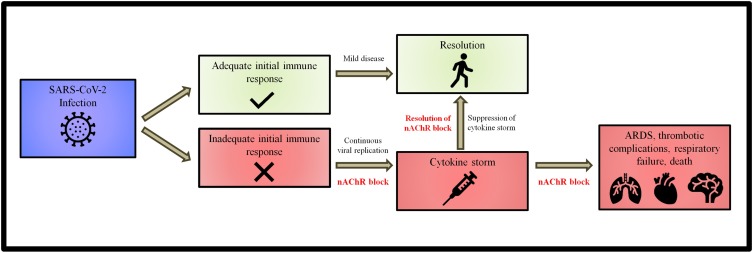In conclusion, we noticed that most of the clinical characteristics of severe COVID-19 could be explained by dysregulation of the cholinergic anti-inflammatory system. The observation that patients eventually develop cytokine storm which results in rapid clinical deterioration, led to the development of a hypothesis about the series of events associated with adverse outcomes in COVID-19 (Fig. 2).

Fig. 2. Progression of COVID-19 after SARS-CoV-2 infection.
Once someone is infected with SARS-CoV-2, the immune system is mobilized. As the virus replicates, cell and viral debris or virions may interact with the nAChRs blocking the action of the cholinergic anti-inflammatory pathway. If the initial immune response is not enough to combat the viral invasion at an early stage, the extensive and prolonged replication of the virus will eventually block a large part the cholinergic anti-inflammatory pathway seriously compromising its ability to control and regulate the immune response. The uncontrolled action of pro-inflammatory cytokines will result in the development of cytokine storm, with acute lung injury leading to ARDS, coagulation disturbances and multiorgan failure. Based on this hypothesis, COVID-19 appears to eventually become a disease of the nicotinic cholinergic system. Nicotine could maintain or restore the function of the cholinergic anti-inflammatory system and thus control the release and activity of pro-inflammatory cytokines. This could prevent or suppress the cytokine storm. This hypothesis needs to be examined in the laboratory and the clinical setting.

Fig. 2. Progression of COVID-19 after SARS-CoV-2 infection.
Once someone is infected with SARS-CoV-2, the immune system is mobilized. As the virus replicates, cell and viral debris or virions may interact with the nAChRs blocking the action of the cholinergic anti-inflammatory pathway. If the initial immune response is not enough to combat the viral invasion at an early stage, the extensive and prolonged replication of the virus will eventually block a large part the cholinergic anti-inflammatory pathway seriously compromising its ability to control and regulate the immune response. The uncontrolled action of pro-inflammatory cytokines will result in the development of cytokine storm, with acute lung injury leading to ARDS, coagulation disturbances and multiorgan failure. Based on this hypothesis, COVID-19 appears to eventually become a disease of the nicotinic cholinergic system. Nicotine could maintain or restore the function of the cholinergic anti-inflammatory system and thus control the release and activity of pro-inflammatory cytokines. This could prevent or suppress the cytokine storm. This hypothesis needs to be examined in the laboratory and the clinical setting.

